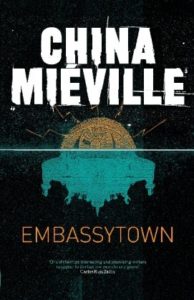I read four books recently that really brought home a fundamental issue in fiction generally, but science fiction in particular. Over Christmas, I read ‘The Hunger Games’ trilogy, and I’ve just finished China Mieville’s ‘Embassytown’.
There have been all sorts of claims made about ‘The Hunger Games’: that it’s wildly original, groundbreaking – claims I can’t say I agree with. The idea of a competition to the death must be as old as storytelling itself, and the idea of a such a competition being broadcast as a reality show has been around at least since Stephen King’s ‘The Long Walk’, and later, ‘The Running Man’.  More recently, the idea of teenagers made to fight to the death in an arena for other people’s entertainment (including some who defy that system) is the theme of the novel ‘Battle Royale’ by Koushun Takami, and later the film of the same name. I haven’t read the book, but the events of the film are much harsher and immediate – and realistic – than ‘The Hunger Games’.
More recently, the idea of teenagers made to fight to the death in an arena for other people’s entertainment (including some who defy that system) is the theme of the novel ‘Battle Royale’ by Koushun Takami, and later the film of the same name. I haven’t read the book, but the events of the film are much harsher and immediate – and realistic – than ‘The Hunger Games’.
However! What Suzanne Collins has done with the story, in my view, is give that idea enough of her own twist to let us see it in a new light. And, crucially, she’s created a story that takes a grip of you and doesn’t let go. And while I value originality – it’s essential brain food, as far as I’m concerned – I want the consumption of it to be as enjoyable as possible. I want a bloody good story, which Collins delivers with savage relish in the first two books, though to a lesser extent in the third, which I thought wallowed a bit. Anyway, for the bulk of this epic trilogy, she turned out a rollicking good read.
There is a stark contrast between ‘The Hunger Games’ and Mieville’s ‘Embassytown’ – and while they’re very different types of books, I’m talking the principles of storytelling here. Mieville is one of my favourite writers (I don’t have one favourite) – I’ve read most of his books, and though I obviously prefer some more than others, he never disappoints. But then I read ‘Embassytown’.
It is an extraordinary story, comprehensively original, featuring an alien race which speaks a type of language that requires two voices speaking in tandem.  Both voices must speak not only in a coordinated way, but with a deeply empathic link (the aliens have two mouths – the humans have to find a way to mimic this). It is a mode of speaking that baffles humans for some time, frustrating their attempts to live and trade with this race, before they come up with the system of ‘Ambassadors’ – pairs of clones with synthesized mind links that allow them to speak the creatures’ language.
Both voices must speak not only in a coordinated way, but with a deeply empathic link (the aliens have two mouths – the humans have to find a way to mimic this). It is a mode of speaking that baffles humans for some time, frustrating their attempts to live and trade with this race, before they come up with the system of ‘Ambassadors’ – pairs of clones with synthesized mind links that allow them to speak the creatures’ language.
That language is intrinsically tied into the way the creatures think; they are incapable of lying, or thinking hypothetically or imaginatively (it’s more complicated than that, but I’m trying to boil it down). They can only say things that are ‘real’ or ‘true’. But their interaction with humans leads some of them to start trying to subvert their own language – to try and speak, and think, in new ways. The results are disastrous, causing violent and near-apocalyptic revolution.
It is a highly intelligent and incredibly imaginative exploration of language, symbolism and communication . . . And though I was intellectually stimulated, I found myself emotionally uninvolved. I failed to engage with the story, or to empathize with the lead character, and the supporting cast – ironic, considering the subject matter.  Instead, this was a book I admired, but did not read with any real passion. While there are plenty of books I read on that basis, it was a surprise to find one of Mieville’s would fall into that category.
Instead, this was a book I admired, but did not read with any real passion. While there are plenty of books I read on that basis, it was a surprise to find one of Mieville’s would fall into that category.
I think a large part of the problem is due to the fact that the main character, Avice, reports on events from the sidelines far more than she takes part in them – things happen around her, rather than to her. It’s also a very slow book, which doesn’t have to be a problem in itself, but it does wander a lot, and when your narrator is telling everything secondhand, it just doesn’t immerse you in the story. Which again is ironic, as ‘immersing’ is her profession; she works on ships crossing the ‘immer’ – the most practical, but nauseating, means of traversing deep space.
As my brother put it, this is a bunch of really wonderful ideas looking for a story. For me, this is science fiction’s recurring weakness; it’s a genre where new ideas are valued above all else, so sometimes the plots don’t receive enough attention. I think that’s why the short story scene in sci-fi is so active – a short story can take an idea and play on it for a while without having to work within a sophisticated plot. For a novel, you really need the story to get you through.
‘The Hunger Games’ is not a book like ‘Embassytown’, and is not trying to be. It is a bit irritating that Katniss, the main character, is never faced with having to make the one terrible decision the games were designed to force upon the participants. You’ll know what I’m referring to if you’ve read it, or are going to – if you don’t, I don’t want to spoil anything. In a story full of moral ambiguity, Collins spares Katniss from the biggest moral quandary of all.
But overall, this story engrossed me – something that a much more original and thought-provoking work by one of my favourite writers failed to do.
